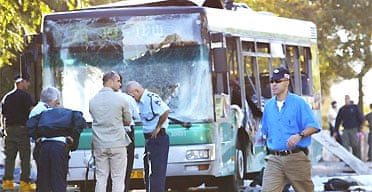A Palestinian suicide bomber killed 11 people in Jerusalem today when he blew himself up on a bus crowded with schoolchildren and rush-hour commuters.
The blast blew out the windows of the green city bus. A torso that had fallen over the side of the bus was covered with a white and blue chequered blanket. Debris covered the street and body parts lay on the sidewalk. Children's sandwiches and schoolbooks lay scattered in the street.
A 14-year-old girl was among the dead. Hospital officials said at least half the 49 people wounded were children.
The bomber detonated the explosives at about 7.10am local time (0510 GMT) as the Number 20 bus halted at a stop in Jerusalem's residential Kiryat Menachem neighbourhood.
Rescue workers, some with white masks over their mouths and noses, lined up black plastic body bags in a row on the pavement along Mexico Street, which runs through a hilly working class and immigrant neighbourhood on Jerusalem's southern edge. A dead man's arms dangled from a broken window, smearing the side of the bus with blood.
Police identified the bomber as Nael Abu Hilail, 22. His family said Abu Hilail left home yesterday and had not returned. His friends said he was a supporter of the Islamic Jihad group, though there was no claim of responsibility by the group.
A witness, who identified himself only as Tomer, said he was in a car behind the bus when the blast went off.
"I heard the explosion and then I heard screaming," he told Israel Radio. "I saw people hanging out the windows ... I saw two people on the bus climbing out the bus window ... All I saw was flesh, hands, feet, everything you see on TV ... You smell dust and burning and the flesh burning."
The prime minister, Ariel Sharon, convened his security cabinet for an emergency session later today to discuss a response. An aide to Mr Sharon said the assailant was from Bethlehem, an area from which Israeli troops withdrew in August - which raised the possibility that Israel might retake the West Bank town.
The bombing, the first in Jerusalem since July, came as Israel's election campaign was heating up. A continuation of Palestinian bombing and shooting attacks - there have been scores in the past 26 months of fighting - was expected to strengthen Israel's rightwing parties in the January 28 vote.
Raanan Gissin, an adviser to Mr Sharon, confirmed that the assailant was from Bethlehem, just south of Jerusalem. Israeli troops had withdrawn from the town on August 19, as part of an attempt by former Israeli defence minister Binyamin Ben-Eliezer to put in place a gradual truce.
"All our efforts to hand over areas ... and all the talk about a possible ceasefire, that was all window dressing because on the ground there was a continuous effort to carry out as many terrorist activities [as possible]," Mr Gissin said.
Mr Gissin accused the Palestinian Authority of assisting the attackers. There was no immediate Palestinian Authority reaction.
Ismail Abu Shanab, a Hamas leader, said that "the Palestinian people are determined to continue the resistance until we liberate our land".
However, he stopped short of claiming responsibility on behalf of Hamas.
